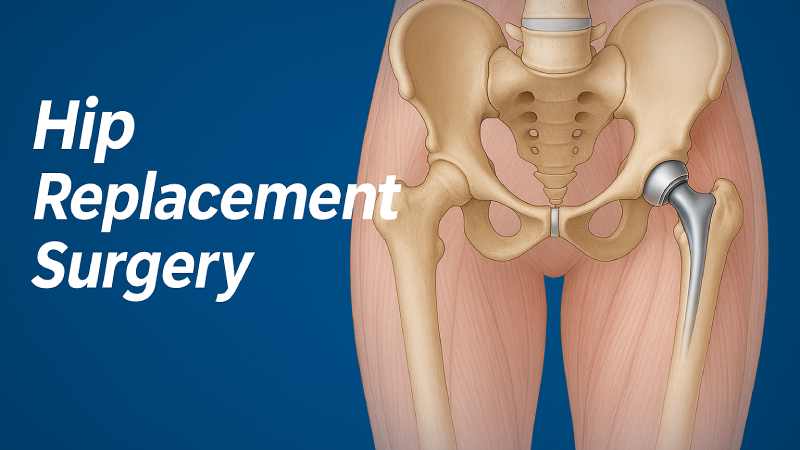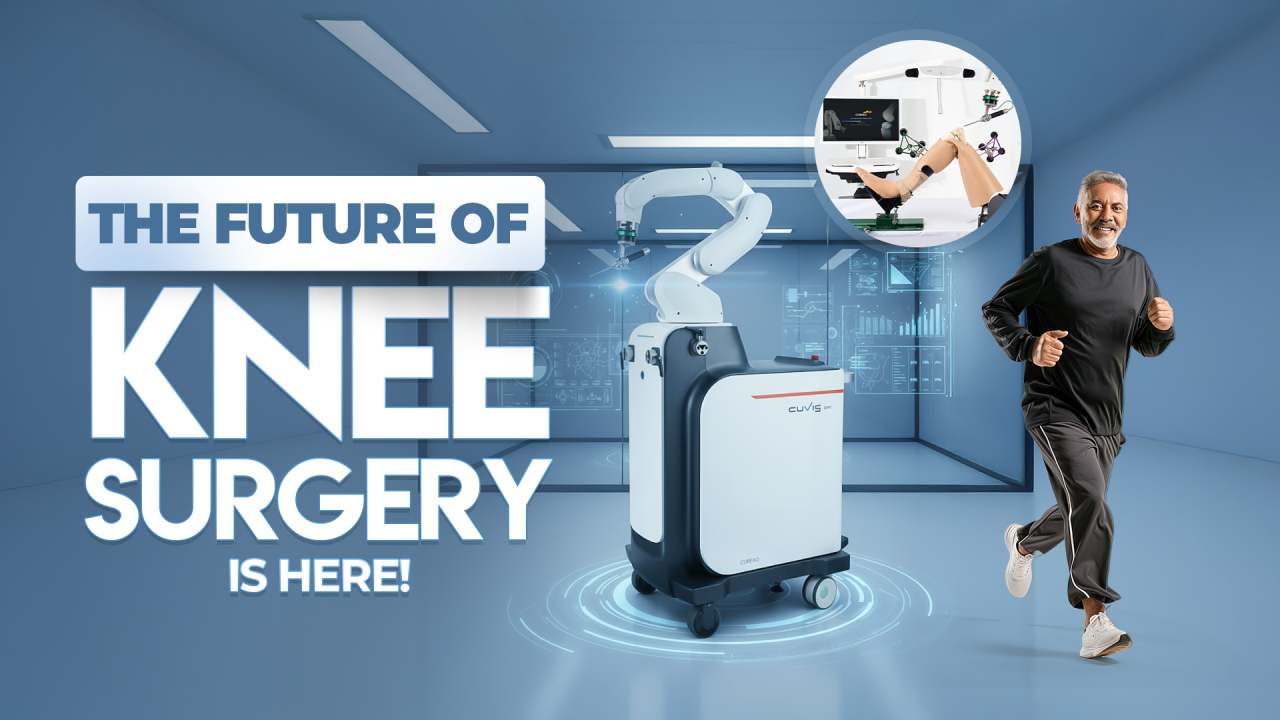List of Top Hip Replacement Surgery doctors near by
Talk to our doctors
Hip Replacement Surgery

Hip replacement surgery, medically referred to as total hip arthroplasty, is a widely performed procedure aimed at replacing a damaged or worn-out hip joint with an artificial prosthesis. This surgery is often considered for individuals experiencing severe hip pain, stiffness, or loss of function due to arthritis, fractures, or other degenerative joint conditions. By restoring the structure and function of the hip, the procedure can significantly enhance a patient's quality of life.
At Kailash Hospital, we provide advanced hip replacement surgeries performed by skilled orthopedic surgeons. With state-of-the-art technology and a patient-centered approach, Kailash Hospital is committed to ensuring optimal outcomes for those in need of hip joint replacement.
Who is a Candidate for Hip Replacement Surgery?
Individuals who suffer from debilitating hip pain and limited movement may be considered for hip replacement surgery. Candidates typically include:
- Osteoarthritis Patients: Those experiencing significant joint damage due to osteoarthritis, which results in the wearing down of cartilage, may benefit from hip replacement.
- Rheumatoid Arthritis Patients: An autoimmune disorder that causes chronic inflammation, rheumatoid arthritis can lead to joint destruction, making surgery necessary.
- Avascular Necrosis Patients: This condition occurs when the blood supply to the hip bone is disrupted, causing bone tissue to die. Total hip joint replacement may be needed in advanced cases.
- Trauma or Fracture Patients: Hip fractures, especially in elderly individuals, can cause severe damage to the hip joint, requiring surgical intervention.
Hip replacement may also be recommended when non-surgical treatments such as physical therapy, medications, or lifestyle modifications fail to provide adequate relief.
Types of Hip Replacement Surgery
Different types of hip replacement procedures are available, depending on the patient's condition and preferences:
- Total Hip Arthroplasty (THA): This involves replacing both the ball (femoral head) and the socket (acetabulum) of the hip joint with prosthetic components. It is the most common form of hip replacement surgery.
- Partial Hip Replacement: In this procedure, only the femoral head is replaced, leaving the natural acetabulum intact. It is often performed in cases of hip fractures.
- Hip Resurfacing: Instead of replacing the entire femoral head, the damaged surfaces of the bone are capped with a smooth metal covering. This option is generally recommended for younger, more active patients.
Benefits of Hip Replacement Surgery
There are several advantages associated with hip replacement surgery:
- Pain Reduction: The primary goal is to alleviate chronic hip pain that interferes with daily life, enabling individuals to resume normal activities.
- Improved Mobility and Function: Replacing the damaged joint restores a greater range of motion and allows for easier movement.
- Enhanced Quality of Life: Patients can participate in activities that were previously limited by hip discomfort.
- Long-Lasting Solution: Modern hip prostheses are designed to last for many years, often exceeding 20 years with proper care.
Hip Replacement Surgery Process
At Kailash Hospital, hip replacement surgery involves a systematic approach, ensuring patient safety and optimal recovery:
- Pre-Surgical Evaluation: The process begins with a thorough assessment that includes a physical examination, imaging tests (X-rays or MRI), and a review of the patient's medical history.
- Anesthesia: The surgery is usually performed under general or spinal anesthesia, keeping the patient pain-free during the procedure.
- Incision and Joint Exposure: A surgical incision is made along the hip to access the damaged joint. The surgeon carefully removes the affected bone and cartilage.
- Implantation of Prosthetic Components: The artificial components, which may be made from metal, ceramic, or plastic, are positioned in place. The new ball-and-socket joint is tested for stability and range of motion.
- Closure and Dressing: The incision is closed with sutures or staples, and a sterile dressing is applied to the wound site.
Diagnosis Before Hip Replacement Surgery
A comprehensive diagnosis is necessary before undergoing hip replacement surgery at Kailash Hospital:
- Physical Assessment: An orthopedic specialist will evaluate the range of motion, pain level, and overall joint function.
- Imaging Studies: X-rays, CT scans, or MRI may be used to determine the extent of joint damage and guide the choice of surgical technique.
- Laboratory Tests: Routine blood work and other pre-operative tests ensure that the patient is in good health and suitable for surgery.
Hip Replacement Surgery Aftercare
After the surgery, following an appropriate aftercare regimen is essential for a successful recovery:
- Hospital Stay: Patients may be required to stay in the hospital for a few days for monitoring and initial rehabilitation.
- Pain Management: Pain relief medication is provided, and the patient may use crutches or a walker for support.
- Physical Therapy: Rehabilitation is crucial to regaining strength and mobility in the hip. A physical therapist will design a personalized program to assist with walking and other movements.
- Follow-Up Appointments: Regular visits to the orthopedic doctor ensure the recovery is progressing as expected, and adjustments can be made if necessary.
Hip Replacement Surgery Cost Considerations
The cost of hip replacement surgery can vary depending on several factors:
- Type of Prosthesis: Different materials used in prosthetic joints (e.g., metal-on-plastic, ceramic-on-ceramic) can influence the overall cost.
- Hospital Charges: Fees for surgical facilities, the length of stay, and any additional services provided by Kailash Hospital will impact the total expense.
- Surgeon’s Experience: The expertise of the hip replacement surgeon may also play a role in determining the cost.
For those searching for "hip replacement doctors near me" or "hip replacement surgeon near me," Kailash Hospital in Noida offers a comprehensive solution with a team of highly qualified orthopedic specialists.
Recovery Timeline for Hip Replacement Surgery
The recovery time for hip replacement surgery varies, but here is a general guide:
- First Few Days: The initial days involve pain management and gradual mobilization, usually with the help of a walker.
- 2-6 Weeks: As healing progresses, the patient will engage in physical therapy exercises to improve hip strength and flexibility.
- 3-6 Months: Many patients can resume low-impact activities such as swimming or cycling during this period, but heavy lifting and strenuous exercises should be avoided.
- 6-12 Months: Full recovery, including the resumption of most daily activities, is often achieved within a year.
Potential Risks and Complications of Hip Replacement Surgery
While hip replacement is generally safe, some risks include:
- Infection: In rare cases, surgical site infection may occur, necessitating additional treatment.
- Blood Clots: Blood-thinning medications may be prescribed to reduce the risk of clot formation.
- Dislocation: The new hip joint may occasionally dislocate, particularly during the early recovery stages.
- Leg Length Discrepancy: Some patients may experience a slight difference in leg length, which can be addressed with physical therapy.
Choosing Kailash Hospital for Hip Replacement Surgery
Kailash Hospital in Noida is a leading provider of hip replacement surgery, offering patients access to top-notch orthopedic care. With a team of experienced surgeons, state-of-the-art facilities, and a patient-focused approach, Kailash Hospital ensures that every aspect of care is addressed, from diagnosis to post-surgical rehabilitation. For those looking for "hip replacement doctors near me" or "hip replacement surgeon near me," Kailash Hospital provides a reliable and high-quality solution.
Hip replacement surgery is an effective treatment for individuals suffering from chronic hip pain and reduced mobility. It offers numerous benefits, such as pain relief, improved function, and an enhanced quality of life. At Kailash Hospital, patients receive the best possible care, with access to expert surgeons and comprehensive rehabilitation services. Whether it's a total hip joint replacement or a more specific hip resurfacing procedure, the dedicated team at Kailash Hospital is committed to helping patients return to a pain-free and active lifestyle.
FAQ'S
Persistent hip pain, stiffness, limited mobility, and difficulty in walking or climbing stairs, especially after non-surgical treatments have failed, could indicate the need for hip replacement.
Yes, hip replacement is commonly performed on elderly patients and has a high success rate in restoring mobility and reducing pain when managed by expert orthopedic surgeons.
Modern implants typically last 15 to 20 years or longer with proper care, though longevity can vary based on activity level and health.
Most patients begin walking with assistance within 24 to 48 hours post-surgery, under the supervision of a physiotherapist.
Yes, a structured rehabilitation program is essential to regain strength, flexibility, and balance in the hip joint.
Kailash Hospital offers advanced orthopedic care with expert joint replacement surgeons, cutting-edge operation theatres, and personalized recovery plans.
Related Blogs
Patient Reviews & FeedBack
© 2025 Kailash Healthcare Ltd. All Rights Reserved















.jpg.jpg)













